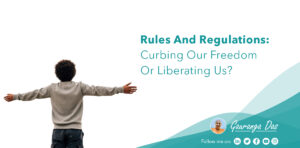All of us are born with a certain amount of freedom. Depending on how we utilise this freedom impacts the direction towards which our life takes its course. We read news articles sometimes with headlines like, “An auto driver’s daughter topped UPSC.” Life doesn’t offer everyone equal opportunities or facilities. However, how we utilise the given facilities to the fullest and grasp the opportunities when it arises depends on the extent to which we are willing to sacrifice our free will for sense gratification and channel it for higher purposes.
Harry Potter and his free will
One of the world-famous actors, Daniel Radcliffe who became insanely known for playing the role of Harry Potter, struggled with terrible alcohol addiction at a very young age. He stated, “I was living in constant fear of who I’d meet, what I might have said to them, what I might have done with them, so I’d stay in my apartment for days and drink alone. I was a recluse at 20. It was pathetic – it wasn’t me. I’m a fun, polite person, and it turned me into a rude bore.” However, what is commendable is, his free will was later redirected to overcome the addiction and he recovered from it.
Likewise, all of us are suffering from various material miseries that toil us to the extent we seek quick fix escapism within the same material conundrum that caused us problems in the first place. The only solution is using our free will for the service of the Lord who is above the modes of material nature.
Regulative principles of freedom
rāga-dveṣa-vimuktais tu
viṣayān indriyaiś caran
ātma-vaśyair vidheyātmā
prasādam adhigacchati
A person free from all attachment and aversion and able to control his senses through regulative principles of freedom can obtain the complete mercy of the Lord.
One particular phrase here, ātma-vaśyair vidheyātmā is translated as ‘regulative principles of freedom’ by Srila Prabhupada in his Bhagavad Gita As It Is. Regulation principles of freedom means, by regulating and controlling certain activities of the senses, one becomes free from the miseries arising from such sense gratification. This may appear contradictory. But just like when we stop someone who is trying to jump off a building against his free will simply to save his life, by curbing the senses from pursuing material pleasures we save our soul from a great disaster of falling into the pool of perpetual cycle of birth and death. This in return offers a sense of higher, superior freedom.
Youth are like kites cut off of their tails
Let’s say, a child approaches the mother and says, “I found this bottle (of cyanide). I want to drink this.” Do you think the mother will reply, “Have you added salt in that?” Definitely No. The mother will immediately snatch it away. Does that mean the mother is acting against the free will of the child? She is acting with the proper understanding and knowledge because the child is ignorant of the consequences of drinking the liquid in that bottle although it appeared nowhere near anything typically dangerous.
Children grow up under the guidance of their parents until the age of eighteen. Once they cross that age, they usually do want they want and that is exactly the age where people make a mess out of their lives. At least that is the case in Indian society. Although the son becomes an adult by law at the age of eighteen, the mother still considers him as an eight-year-old. When she starts questioning him where he is going and when he is going immediately he feels there is an interference in his free will. Just like a kite cut off of its tail gets stuck or torn apart by a tree branch, the boy who decided to fly high gets toiled by the material entanglements.
Misdirected free will at university hostels
So, therefore we find many youngsters who newly join colleges at the age of seventeen or eighteen start living in the hostels, come across so many avenues for sense gratification. These are exact children who spent previous years of their lives in pious families. However, strangely when they step into the college campus environment or when they begin interacting with the people there, and mingling with those who are indulging in unscrupulous and inappreciable activities, they just get completely spoiled and ruined. They instantly lose touch with the culture and values they were brought up in. Smoking, drinking and all kinds of nonsensical activities creep into their precious lives and destroy their valuable youth. These are not mere circumstantial turns of events in their lives. Rather the choices made are based on insignificant availability of freedom simply satisfy the temporary urges of the senses.
The danger is, one doesn’t even realise he is suffering. In that ignorance, he thinks he is in bliss when he ignores the external and internal problems by numbing his consciousness by sleeping in hostel bunk beds as there is no one to wake him up early like how his father used to do back at home. Slowly he develops the courage to take in intoxications and eats dead food prepared with terrible consciousness.
Indeed the misuse of free will is so subtle that we don’t recognise that we are misusing a golden opportunity to turn the tables around and bring about a change of heart. In conclusion, Free will is to be used for a higher purpose towards God-realisation, for the betterment of one’s well-being and for serving others selflessly and for nothing else.




